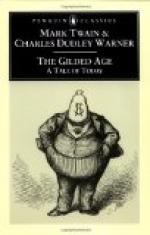The family consisted of the Squire and his wife, a son and a daughter married and not at home, a son in college at Cambridge, another son at the Seminary, and a daughter Alice, who was a year or more older than Ruth. Having only riches enough to be able to gratify reasonable desires, and yet make their gratifications always a novelty and a pleasure, the family occupied that just mean in life which is so rarely attained, and still more rarely enjoyed without discontent.
If Ruth did not find so much luxury in the house as in her own home, there were evidences of culture, of intellectual activity and of a zest in the affairs of all the world, which greatly impressed her. Every room had its book-cases or book-shelves, and was more or less a library; upon every table was liable to be a litter of new books, fresh periodicals and daily newspapers. There were plants in the sunny windows and some choice engravings on the walls, with bits of color in oil or water-colors; the piano was sure to be open and strewn with music; and there were photographs and little souvenirs here and there of foreign travel. An absence of any “what-pots” in the corners with rows of cheerful shells, and Hindoo gods, and Chinese idols, and nests of use less boxes of lacquered wood, might be taken as denoting a languidness in the family concerning foreign missions, but perhaps unjustly.
At any rate the life of the world flowed freely into this hospitable house, and there was always so much talk there of the news of the day, of the new books and of authors, of Boston radicalism and New York civilization, and the virtue of Congress, that small gossip stood a very poor chance.
All this was in many ways so new to Ruth that she seemed to have passed into another world, in which she experienced a freedom and a mental exhilaration unknown to her before. Under this influence she entered upon her studies with keen enjoyment, finding for a time all the relaxation she needed, in the charming social life at the Montague house.
It is strange, she wrote to Philip, in one of her occasional letters, that you never told me more about this delightful family, and scarcely mentioned Alice who is the life of it, just the noblest girl, unselfish, knows how to do so many things, with lots of talent, with a dry humor, and an odd way of looking at things, and yet quiet and even serious often—one of your “capable” New England girls. We shall be great friends. It had never occurred to Philip that there was any thing extraordinary about the family that needed mention. He knew dozens of girls like Alice, he thought to himself, but only one like Ruth.




